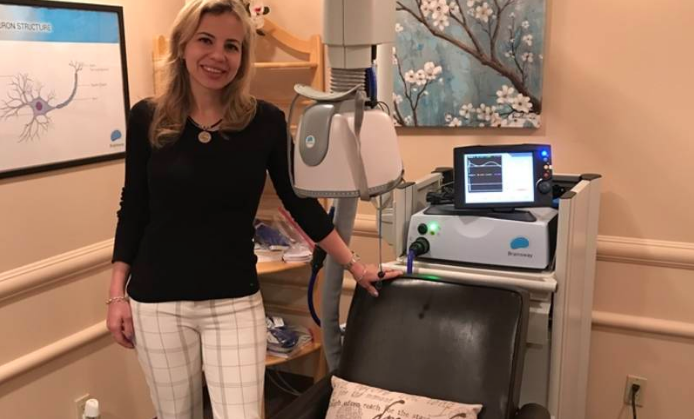
Summit Doctor Uses Helmet To Treat Depression
Deep Transcranial Magnetic Stimulation is a cushioned helmet that is placed over a patient’s head and brief magnetic fields are generated.
By Alexis Tarrazi, Patch.com
SUMMIT, NJ — There are 15 million Americans suffering from clinical depression and nearly half will not respond to or cannot tolerate drug medication, according to the Anxiety and Depression Association of America.
Offering an alternative to her patients, Dr. Violina Frenkel who runs her own private practice in Summit and is the vice chair and chief of Clinical Psychiatry at Overlook Medical Center, is helping to treat depression in her patients with Deep Transcranial Magnetic Stimulation (TMS).
This is a cushioned helmet that is placed over a patient’s head and brief magnetic fields – at an amplitude similar to that used in an MRI – are generated. Patients typically undergo this FDA cleared non-invasive therapy in 20-minute daily sessions in their psychiatrist’s office for about four to five weeks.
Frenkel specializes in treating depression, anxiety and bipolar disorder. Treating more than 800 patients in this area, Frenkel saw a pattern in her patients.
“What ends up happening is you give medicine and patients don’t respond or have side effects where they can’t tolerate the medication,” Frenkel told Patch. “Before TMS the patients were going from medication to medication to medication. And the more medication, the more resistance the brain develops to the medications.”
Frenkel was happy to learn about TMS as an alternative for her patients.
“Medicine works on the receptors in the brain and TMS works on the structure and activates neurons that weren’t activated before.”
Frenkel got her own TMS for her practice in December and has already seen results in her patients.
“So far I have to tell you I myself am very much impressed,” Frenkel said of the TMS. “I’ve had patients on medication or antidepressants and were doing OK and they saw a 50 percent improvement. Once I added TMS, patients improved rapidly to the point where I had to remove the medication they are on after just three weeks.”
One of Frenkel’s patients, who suffered from severe depression spoke to Patch anonymously because of her profession as a federal employee.
The patient started to feel depressed beginning in November because of the pressures at her work. By January she was involved in a car crash that caused memory loss and deepened her depression.
“My symptoms were so bad that I didn’t want to get out of bed or get dressed,” the patient said. “It was difficult to do normal things, food shop or pay bills.”
She was on a few anti-depressants, but they didn’t work. In February she began TMS five times a week.
“By week two I started feeling better, more focused and I was actually able to enjoy things I couldn’t enjoy before,” the patient said. “By week four, my life started changing significantly.”
Now she is no longer on any medications.
With the results Frenkel is seeing, she is urging other physicians to invest in TMS.
“The machine is expensive, a couple hundred thousand dollars but am so excited to provide another treatment option for my patients,” Frenkel said.

